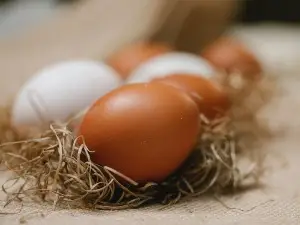
Watching an egg hatch can be amazing and nerve-wracking.
After 21 days or so, the baby will start chirping within the shell, break through it, unzip the egg, and hatch. But what happens if your chick has pipped but didn’t break the membrane? This article looks into it
The reason why your chick pipped but didn’t break the membrane is likely because the membrane has become dry, tough, and rubbery. This makes the membrane too tough to break through. You can create a safety hole in the egg and wet the membrane to help the bird out
Chick pipped but didn’t break the membrane
The membrane is the protective layer of the egg, this layer is made up of calcium carbonate. It protects the growing chick from pathogens that can harm the growth of the bird.
One would think that a chick would have trouble breaking through this tough shell layer, but the chick may also have trouble breaking through the egg’s membrane as well, this is why:
Why this happens:
When a chick begins to hatch from an egg it uses its whole body and strength to break through the egg’s membrane and the eggshell.
If the humidity levels in the incubator are too high, then the bird can drown in the egg. If the humidity levels in the incubator are too low, then the membrane will be too dry, tough, and rubbery.
A dry, rubbery and tough membrane will be tough for the chick to break through, the membrane may even get stuck on the bird as it is trying to hatch.
Chicks will try to hatch and break through the shell but they will not be able to rip through the membrane if it is too dry, rubbery, and tough.
What to do
Breaking through the membrane can be a lot of work for baby chicks, especially if it is on the drier side.
Chirping sounds coming from the egg is a good sign, this shows that the bird has enough oxygen. Pipping means that the bird is still strong enough to break through the egg.
If this is the case, you can leave the egg and chick alone and see if it hatches naturally
If the chick isn’t pipping or chirping then it may be too tired to keep on going anymore, or, it may have run out of air
If the bird has pipped but hasn’t made progress in the last 18-24 hours then you may have to help it along. You can help the bird by creating a safety hole and wetting the membrane a little bit.
Making a safety hole in the egg and moistening the membrane of the egg will help the bird hatch. Not only will doing this get more oxygen into the egg and prevent suffocation, but it will also make the membrane soft enough for the bird to break through.
How to do it:
All you’ll need is a screw, some water, and some patience.
Start off by finding where the egg’s air sac is, the air sac is usually at the blunt end of the egg. Candling the egg to find the air sac is also a good idea.
Once you’ve found the air sac, start to twist the screw back and forth, on the shell, where the air sac is. Do this until you create a hole the size of the tip of the screw, this hole is enough to get more air into the egg.
Once the hole has been created, place a drop of water on the air sac making sure that it enters the hole and doesn’t create a blockage in the safety hole. The membrane doesn’t need a lot of water to become moist.
You can place the egg back into the incubator after you’ve made the hole and moistened the membrane. The chick should be able to hatch out of its egg once you’ve done this.
How do you know if a chick died before hatching?
You’ll know that the egg died once you candle the egg. Candling is going into a dark room and shining a light behind the egg to see inside.
An egg that has died will be free from any visible structures or dark areas.
If the egg starts hatching, and you place it close to your ear, but you don’t hear peeping sounds and you don’t see the egg moving then the bird may be dead.
Wait at least 18-24 hours after the first zip before assuming that the egg died.
What happens if a chick is hatched but still attached to the shell?
A chick hatching, but still being attached to the shell, is pretty normal, the shell will eventually detach from the bird as it dries off.
Conclusion
In conclusion, the humidity levels that your incubator is set at can affect your chicks towards hatching time.
If the incubator is set to create an environment with too low levels of humidity, then the membrane will dry up and become rough and rubbery.
The chick won’t be able to break through this rough, dry, and rubbery membrane, it will pip but not break through the membrane.
If this is the case with your bird, you can create a safety hole in your bird’s eggshell and then dampen the membrane with some water, the bird should be able to hatch after you do this.
If you enjoyed this article then you may also be interested in other chicken related articles. Here are some articles that you may be interested in: Chick Broke Shell But Not Membrane, Bump On My Chickens Head, White Spots On Chickens Head, Chicken Has An Abscess On Its Face, My Baby Chick Keeps Falling Over

